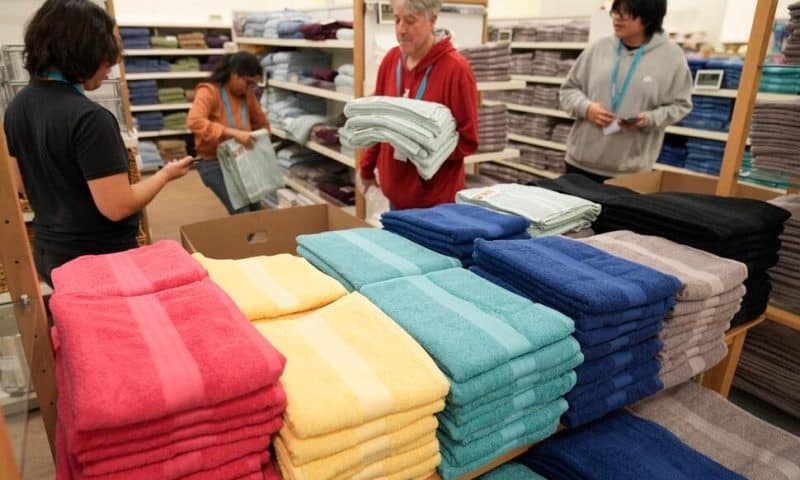American shoppers picked up their spending a bit in February after pulling back the previous month
Americans picked up their spending a bit in February after pulling back the previous month. But last month’s gain was weaker than expected, and January’s decline was revised even lower, suggesting that many are growing more cautious with their money.
Retail sales rose 0.6% last month after falling a revised 1.1% in January, dragged down in part by inclement weather, according to the Commerce Department’s report on Thursday.
February’s number was also lifted in part by higher gas prices as well as higher auto sales and a rebound in building materials, which were depressed by severe weather in January. Excluding sales from gas stations and auto dealers, sales rose 0.3%.
The national average gas price Thursday was $3.41 per gallon, per AAA, up from$3.39 a week ago, and $3.26 last month.
Government retail data isn’t adjusted for inflation, which ticked up 0.4% from January to February, higher than the previous month’s figure of 0.3%, according to the latest government report. So retailers only eked out a slight increase accounting for inflation.
“February retail sales provide further proof that spending on discretionary goods in 2024 is likely to be soft following several years of strong growth and as consumer health – albeit still relatively strong – is somewhat weighed down by inflation and reduced savings,” said David Silverman, senior director at Fitch Ratings.
The report also reflects an ongoing spending shift away from goods toward services. The snapshot offers only a partial look at consumer spending and doesn’t include many services, including travel and hotel lodges. But the lone services category – restaurants – registered an uptick of 0.4%.
“Elevated interest rates, an uptick in energy costs, and persistent discomfort with price levels continue to push consumers to make trade-offs with budgeting, with goods categories increasingly overlooked in favor of services spending,” said Kayla Bruun, senior economist at Morning Consult, a data intelligence firm.
Business at department stores fell 0.2%, while clothing and accessory stores posted a 0.5% drop. Furniture and home furnishings stores had a 1.1% decline. Online sales showed a rare decline of 0.1%. Electronics and appliance stores had a solid 1.5% increase.
A strong jobs market and rising wages have fueled household spending, which also has become choppy in the face of rising credit costs and higher prices.
America’s employers continued to hire in February, adding a surprising 275,000 jobs, underscoring the U.S. economy’s resilience despite efforts of the U.S. Federal Reserve to knock down inflation by slowing spending.
While costs for many goods appear to have plateaued, consumer prices in the United States picked up last month. That again revealed the complexity of the Fed’s task in slowing the economy to keep prices in check, and also a potential headache for President Joe Biden in his bid for re-election.
The most recent quarterly financial reports from big retailers like Walmart,Target and Macy’s show that their customers are looking for deals and in many cases sticking to the necessities when they shop.
“They continue to shop but they are more constrained, ” Target CEO Brian Cornell told The Associated Press in an interview last week. “People are using credit cards to get through the month. Rent costs across the country are up, and gas has been volatile.”
Chris Riccobono, founder of New York clothing chain Untuckit. said his experience indicates that customers are waiting for items to go on sale before making purchases. Riccobono nonetheless hopes to cut back on the company’s reliance on discounts to drive sales. Before the coronavirus pandemic, Untuckit only held sales three times a year.
“I want to start to train our customers to get back into the pre-COVID days,” he said.
Yet even with some customers hesitant to spend, Untuckit, which began as an online retailer, plans to add 14 more stores this year, bringing its total to close to 100.

